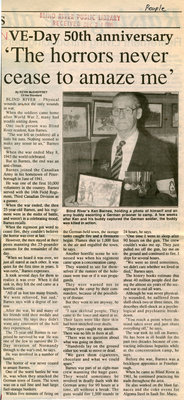VE Day 50th Anniversary, Blind River, The Standard, 1995
- Full Text
People
VE-Day 50th anniversary
'The horrors never cease to amaze me'
By KEVIN McSHEFFREY
of the Standard
BLIND RIVER - Physical wounds are not the only wounds in war.
When the soldiers came home after World War 2, many had trouble settling down.
One such person was Blind River resident, Ken Barnes.
"The war left us (soldiers) all a little bit nuts. Nothing seemed to make any sense to us," Barnes says.
When the war ended May 8, 1945 the world celebrated.
But to Barnes, the end was an anti-climax.
Barnes joined the Canadian Army in his hometown of Peterborough in June of 1941.
He was one of the first 10,000 volunteers in the country. Barnes served with the 14th Field Regiment, Third Canadian Division as a gunner.
When the war ended, the then 25-year-old Barnes, and his regiment were in the midst of battle, and weren't in a celebrating mood, Barnes recalls.
When the regiment got word to cease fire, they couldn't believe the horror was over at last.
However, the men stayed at their posts manning the 25-pounder cannons for the remainder of the day.
"When we heard it was over, we just all stared at each other. It was quiet for the first time in years. It was eerie," Barnes expresses.
It took several days for them to realize it was over When it did sink in, they felt the end came at a horrific cost.
"All of us lost too many friends. We were relieved, but sad," Barnes says with a degree of sorrow.
After the war, he and many of his friends sold their medals and mementos. He says they didn't want any souvenirs of the hell they experienced.
The 75-year-old Barnes is surprised he survived he war. He was one of the few to survive the D-Day invasion of Normandy through to the war's end, he says.
He was involved in a number of battles.
The horror of war never ceased to amaze Barnes.
One of the worst battles he was in, was when they attacked the German town of Essen. The town was on a rail line and had large fuel-storage bunkers.
Within five minutes of firing on the German-held town, the storage tanks caught fire and a firestorm began. Flames shot to 1,000 feet in the air and engulfed the town, he says.
Another horrific scene he witnessed was when his regiment came upon a concentration camp.
They wanted to see for themselves if the rumors of the holocaust were true or if it was propaganda.
They were warned not to approach the camp by their commanders, because of the possibility of disease.
But they went to see anyway, he says.
"I saw skeletal people. They came to the fence and stared at us. Their faces were like their skin had been stretched over skulls.
"Their eyes caught my attention. There was no life in them at all.
"There was no question about what was going on there.
"Hundreds lay on the ground either too weak to move or dead.
"We gave them cigarettes, chocolate and what we could spare."
Barnes was part of an eight-man crew manning the huge guns. They would sometimes be involved in deadly duels with the German army for 90 hours at a time, all without a break. The guns would fire 1,500 rounds in
24 hours, he says.
"One time I went to sleep after 90 hours on the gun. The crew couldn't wake me up. They just pulled me off the gun, lay me on the ground and continued to fire. I slept for several hours.
"We were so tired sometimes, we didn't care whether we lived or died," Barnes says.
The history books estimate that about 40 million people died during the almost six years of the second war to end all wars.
Although he was never physically wounded, he suffered from shell-shock two or three times. He describes shell-shock as a psychological and psychiatric breakdown.
"You reach a point where the mind takes over and just shuts everything off," he says.
The war took its toll on Barnes. He has been in ill health for the past two decades because of contracting infectious hepatitis while at the concentration camp, he says.
Before the war, Barnes was a bricklayer apprentice in Peterborough.
When he came to Blind River in 1961, he continued practicing his trade throughout the area.
He also worked on the blast furnaces and the coke ovens for Algoma Steel in Sault Ste. Marie.
Photo
Blind River's Ken Barnes, holding a photo of himself and an army buddy escorting a German prisoner to camp. A few weeks after Ken and his buddy captured the German soldier, the buddy was killed in action.
- Creator
- Kevin McSheffrey, Author
- Media Type
- Text
- Image
- Item Type
- Clippings
- Description
- This article shares seventy-five year old Ken Barne's memories of serving in world war two, the long hours of battle, the horrors he witnessed and the psychological and health after effects he has experienced.
- Notes
- A photo accompanying the article shows Mr. Barnes wearing war medals. He holds a photo of himself and a buddy escorting a German prisoner to camp.
- Date of Original
- December 21, 1995
- Subject(s)
- Local identifier
- Local people
- Language of Item
- English
- Geographic Coverage
-
-
Ontario, Canada
Latitude: 46.18336 Longitude: -82.95817
-
- Copyright Statement
- Protected by copyright: Uses other than research or private study require the permission of the rightsholder(s). Responsibility for obtaining permissions and for any use rests exclusively with the user.
- Contact
- Blind River Public LibraryEmail:brpl.ceo@gmail.com
Website:
Agency street/mail address:8 Woodward Avenue
P.O. Box 880
Blind River, ON P0R 1B0
(705) 356-7616



